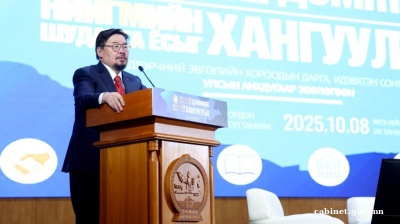Russian President Vladimir Putin will next week visit Mongolia, despite the country being a member of the International Criminal Court (ICC) that has an outstanding arrest warrant on Russia’s leader.
The Kremlin said the official visit would take place on September 3. Putin, it said, was due to “participate in ceremonial events dedicated to the 85th anniversary of the joint victory of Soviet and Mongolian forces over Japanese militarists on the Khalkhin Gol River”.
The ICC issued the arrest warrant for Putin in March 2023. It accused the Kremlin strongman of being responsible for the illegal deportation of children from Ukraine. Such deportation constitutes a war crime.
The Kremlin added that the visit would take place at the invitation of President of Mongolia Ukhnaa Khurelsukh.
Putin has not visited an ICC member state since the warrant was issued.
Under the ICC’s founding treaty, the Rome Statute, if a suspect for whom an arrest warrant has been issued by the court sets foot on the soil of an ICC-member country, that country is bound to detain the suspect.
However, as the Associated Press reported on August 28, the court does not have any enforcement mechanism backing up this stipulation. The press agency wrote: “In a famous case, then Sudanese President Omar al-Bashir wasn't arrested in 2015 when he visited South Africa, which is a member of the court, sparking angry condemnation by rights activists and the country’s main opposition party.”
The Kremlin, which emphasises that it does not recognise the jurisdiction of the ICC, has not commented on the prospects of Putin being arrested in Mongolia.
Last year, Putin eventually opted to skip a summit of the BRICS bloc of developing economies held in South Africa, another ICC member country. The decision was widely seen as coming as a big relief to the South African government. While other BRICS leaders met in person in Johannesburg, Putin appeared at the summit via a video link.
The major tensions between the Kremlin and Armenia, meanwhile, over the latter’s increasing orientation towards the West, have been aggravated by the decision of the Armenian government to take their country into the ICC.
One matter Putin might want to raise with the Mongolians on his visit is Ulaanbaatar’s decision two weeks ago to not include the Power of Siberia 2 natural gas pipeline project on its schedule of infrastructure projects through 2028.
Analysts have pointed to how Moscow and Beijing are yet to resolve gas pricing disagreements and other matters related to the 2,594-kilometre (1,612-mile) pipeline—which would send Russian gas to China via Mongolia—but the Mongolians might be wary of invoking Western secondary sanctions related to Ukraine war sanctions on the Kremlin by helping to progress the project. With Russia and China still at odds over key project details, Mongolia may have decided to use that as an excuse to, for now, avoid the difficulties that could be posed by committing to the rollout of the mega infrastructure.
News

Lebanon faces year-end deadline for $250mn World Bank reconstruction loan
Finance Minister Yassine Jaber warns delays raise concerns funding could be cancelled if the loan is not approved by December 31.

Telefónica pulls out of its last Spanish-speaking markets in Latin America
Telefónica SA has entered a decisive phase of restructuring, marking a retreat from Latin America’s Spanish-speaking markets as it consolidates operations in Europe and Brazil.

Nigeria's Ondo State announces $50bn investment framework for proposed 500,000bpd refinery, free trade zone
Ondo State signed a $50bn investment agreement with a consortium of international firms, including China Harbour Engineering Company and Honeywell OUP, to build a 500,000-bpd refinery and develop a 1,471-hectare free trade zone.

Nato chief downplays US troop withdrawal, reaffirms commitment to Romania
Nato Secretary General Mark Rutte sought to ease concerns over the recent withdrawal of a US infantry brigade from Romania.




